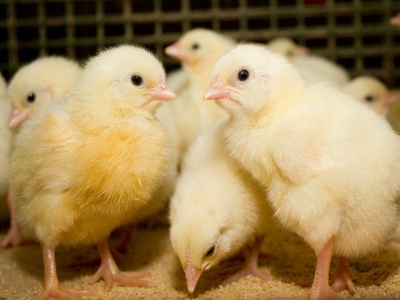Black soldier fly meal may boost growth, survival of broilers

Broiler chickens on a diet with black soldier fly larvae may out-perform birds on a commercial feed, and survive longer in the face of a disease challenge, say researchers.
An international team of researchers in South Korea and the US explored the use of black soldier fly larva (BSFL) meal in the diets of broiler chicks as a potential feed ingredient, and in regards to the influence the meal had on immune function.
“The objective of this study was to evaluate productivity, immunity, and experimental Salmonella infection of broiler chicken fed with BSLF,” the researchers said.
In a series of feeding and disease challenge trials, the researchers found that use of the BSFL meal improved chick weight gain and boosted production of immune system elements. The meal also was linked to improved survival in a disease challenge against Salmonella Gallinarum.
“These findings suggest that BSFL feeding can stimulate nonspecific immune responses in broiler chicks and increase their survivability against S. Gallinarum experimental infection,” they said.
The bacteria S. Gallinarum causes fowl typhoid, a disease, which can result in anemia, intestinal tract hemorrhage, leukocytosis and hepatosplenomegaly, the researchers said. The disease remains a considerable problem for producers in some parts of the world.
“BSF larvae (BSFL) can provide high-value feedstuff because they are rich in protein (40 to 44%) with better amino acid profile compared to soybean meal,” wrote the authors. “BSFL has high dry matter (DM) content (35 to 45%).”
“They are rich in lysine (6 to 8% of crude protein (CP)), Ca (5 to 8% DM), and P (0.6 to 1.5% DM),” they added. “BSFL are also rich in fat, which has extreme quantitative (15 to 49%) and qualitative variability depending on the chemical compositions of their rearing substrates.”
Methods and materials
The researchers outlined how they conducted three feeding trials to examine growth performance, monitor bird survival against a disease challenge and assess immunological reaction to the feed ingredient.
In each of the three trials, broiler chicks were given one of four diets, they said. These included a control – a commercially available and antibiotic-free feed, and that feed supplemented with 1%, 2% or 3% BSFL.
In the growth trial, 80 day-old chicks received one of the four diets and tracked for average daily weight gain, feed intake, feed conversion ratio, they said.
During the immunological assay, chicks were given one of the four diets for a period of 20 days, said the team.
“Chicks were subjected to immunological assays including the assay for determining spleen T lymphocyte subpopulations, lysozyme activity, and spleen cell proliferation assay."
In addition to the spleen, blood samples also were collected for analysis, they said.
For the disease challenge, chicks on all four diet were fed for a three-week period and confirmed to be salmonella-free, they said. At that point, each bird was orally challenged with S. Gallinarum.
Birds were then observed for 15 days and the survival rate was noted, they said. Fecal samples were taken on days 1, 5, 10 and 15 post-challenge.
At the end of the trial, all remaining birds were harvested and their liver, cecum, spleen and bursa of Fabricus were collected, the researchers said. “Viable bacteria counts in fecal samples and each tissue were determined,” they added.
Results
In the initial feeding trial, adding the BSFL increased the average daily weight gain during the experimental period, the researchers said. The control group took 32 days to reach the target weight of 1.3kg, while the birds getting the supplemented feed reached that weight in 30 days.
In the immunological examination, birds getting the insect-supplemented diets were found to have linearly increasing percentages of CD3+CD4+ T lymphocytes in their spleens, they said. All three groups were significantly higher than that found in control birds.
“These results imply that BSFL can confer benefit to immune function in broiler chicks,” they said.
Similarly, spleen lymphocyte proliferation was increased linearly for birds on the supplemented diets when compared to the control, they said.
“These results indicate that mitogenicity of lymphocytes in broiler chicks is enhanced by ingestion of BSFL."
Serum lysozyme concentrations also increased in a “dose-dependent” manner for birds getting the diets with BSFL meal, the researchers said. Birds on the 2% and 3% BSFL diets had higher concentrations than the control.
“Increased lysozyme activity in the serum is associated with increased destructive activity of phagocytes,” they said. “These results indicate that continuous ingestion of BSFL is able to stimulate the activation of phagocytes.”
During the disease challenge control group birds started to display mortality on day 3 post-infection, they said. Birds on the supplemented diets survived for 2 or 3 days past that point.
“Final survival rates in 1, 2 and 3% BSFL-fed groups were 67, 75 and 85%, respectively,” the researchers said. “However, the survival rate of the control group was only 50%.”
All birds on the insect-supplemented diets presented smaller counts of the bacteria when liver, spleen, bursa and cecum were examined, they said. Among the birds on the supplemented diets, bacteria counts declined linearly.
Source: Journal of Veterinary Medical Science
Authors: J Lee, Y-Mi Kim, Y-Kyu Park, Y-Cheol Yang, B-Gie Jung, B-Joo Lee,
Có thể bạn quan tâm
 ‘Better Life’ standard a healthy choice
‘Better Life’ standard a healthy choice Broiler farmers Tienus and Alie Berkepies switched from regular broiler production to Better Life standard (‘Beter Leven’ – 1 star) at the beginning of 2017.
 Poultry red mites are Europe’s most costly poultry pest
Poultry red mites are Europe’s most costly poultry pest This tiny blood sucking arachnid is found in many countries and is very difficult to eliminate from infested farms.
 Calculating additional resource needs in cage-free
Calculating additional resource needs in cage-free Cage-free egg production requires additional manpower and feed, but exactly how much? Experts offer their estimates.